七年级英语下册 Module 9 Life history Unit 3 Language in use教案 (新版)外研版
- 格式:doc
- 大小:104.00 KB
- 文档页数:5
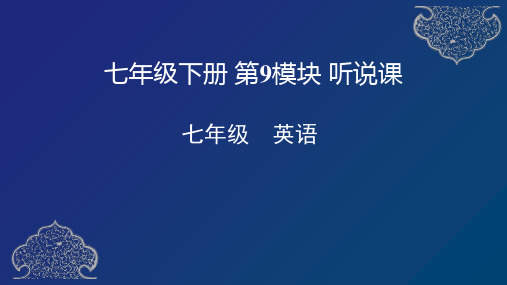
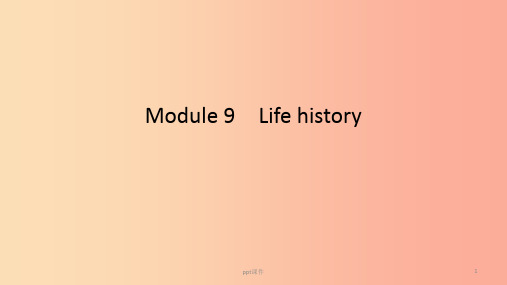
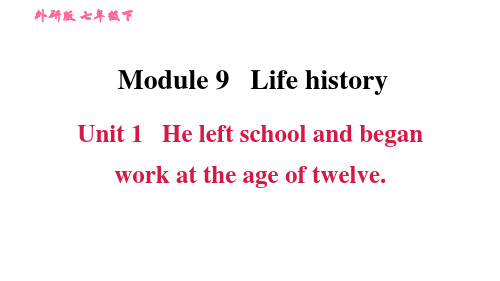
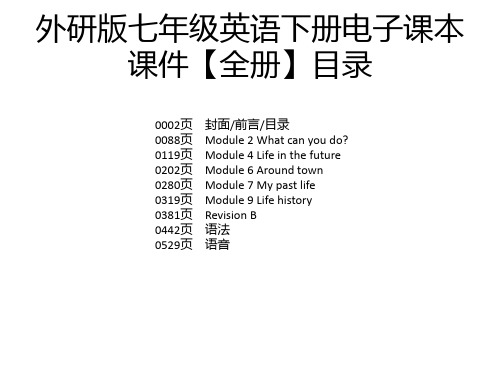
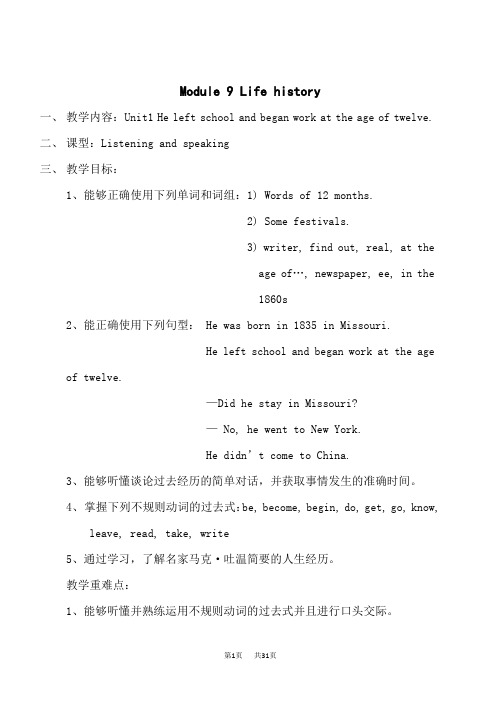
Module 9 Life history一、教学内容:Unit1 He left school and began work at the age of twelve.二、课型:Listening and speaking三、教学目标:1、能够正确使用下列单词和词组:1) Words of 12 months.2) Some festivals.3) writer, find out, real, at theage of…, newspaper, ee, in the1860s2、能正确使用下列句型: He was born in 1835 in Missouri.He left school and began work at the age of twelve.—Did he stay in Missouri?— No, he went to New York.He didn’t come to China.3、能够听懂谈论过去经历的简单对话,并获取事情发生的准确时间。
4、掌握下列不规则动词的过去式:be, become, begin, do, get, go, know,leave, read, take, write5、通过学习,了解名家马克·吐温简要的人生经历。
教学重难点:1、能够听懂并熟练运用不规则动词的过去式并且进行口头交际。
2、掌握不规则动词的过去式和能询问并回答有关过去的事情和经历。
(难点)四、教学准备:课堂整体运用任务型教学模式,培养学生独立自主的学习能力。
本课指导学生通过听说获取信息,培养学生的听说技能。
在教学过程中,采用多媒体手段辅助教学,利用各种图片、实物和习题任务贯穿整个教学过程。
因此,本节课需准备:PPT课件、挂图、录音机、实物、课堂练习表格、奖品五、教学过程:七、板书设计:Module 9 Life historyUnit1. He left school and began work the age of twelve. writer —Did he stay in Missouri?find out —No, he went to New York, and othercities.at the age of… eg. The little boy could play the piano at theage of 4.newspaperin the 1860s eg. Many tall buildings were built in the 1990s.达标训练题一、用所给词的适当形式填空:1. They _____________ (be) very happy yesterday.2. The boy _____________ ( take) a bus to school last week.3. Sam __________ (leave) school at the age of 12.4. Can you ___________ ( write ) your name on the paper?5. Did you _____________ (get) home early yesterday morning?二、选择正确的答案:( ) 1. My grandfather was born __________, but I don’t know the exact year.A. in 1930B. in 1930sC. in the 1930D. in the1930s( ) 2. He came back to China _______ 1979.A. onB. inC. forD. at( ) 3.Children’s Day is in ____________.A. AprilB. JuneC. JulyD. August( )4. The math problem is too difficult. I can’t _________ the answer.A. findB. look atC. find outD. lookfor( )5. Can you pass me today’s ____________? I want to read the news.A .real B. date C. newspaper D. writerModule9 Life history六、教学内容:Unit2 He decided to be an actor.七、课型:Reading and writing八、教学目标:1、能够正确使用下列单词和词组:play, poem, marry, successful, work,build, fire, die, rich, language, around the world, young, finish school2、能够读懂读懂简单的人物传记,掌握段落大意并理解文章细节。
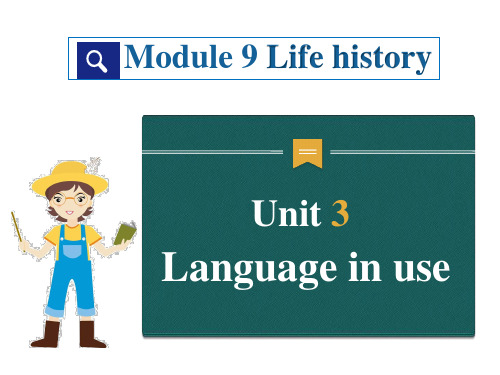
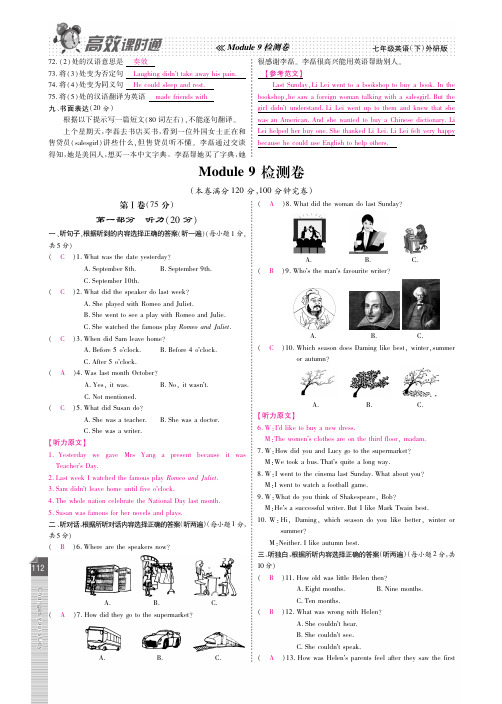
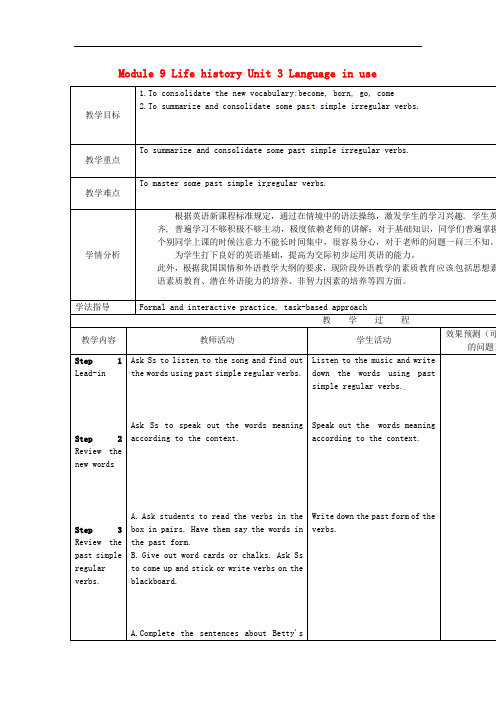
Module 9 Life history Unit 3 Language in use教学目标1.To cons olidate the new vocabulary:become, born, go, come2.To summarize and consolidate some pas t simple irregular verbs.教学重点To summarize and consolidate some past simple irregular verbs. 教学难点To master some past simple irregular verbs.学情分析根据英语新课程标准规定,通过在情境中的语法操练,激发学生的学习兴趣. 学生英齐, 普遍学习不够积极不够主动,极度依赖老师的讲解;对于基础知识,同学们普遍掌握个别同学上课的时候注意力不能长时间集中,很容易分心,对于老师的问题一问三不知。
为学生打下良好的英语基础,提高为交际初步运用英语的能力。
此外,根据我国国情和外语教学大纲的要求,现阶段外语教学的素质教育应该包括思想素语素质教育、潜在外语能力的培养、非智力因素的培养等四方面。
学法指导Formal and interactive practice, task-based approach教学过程教学内容教师活动学生活动效果预测(可的问题)simple regular verbs.Step 4W rite down the past tense forms of the irregular verbs.Step 5 Around the worldStep 6 Module TaskStep6H omework life.plete the passage with the correctform of the words from the box.plete the passage with the correctform of the words.plete the conversation with thecorrectform of the words from the box. You can usethe words twiceAsk Ss to enjoy Shakespeare's hometown.Writing about people in the pa st.Write a paragraph about your past live.A.Find out the irregularve rbs。
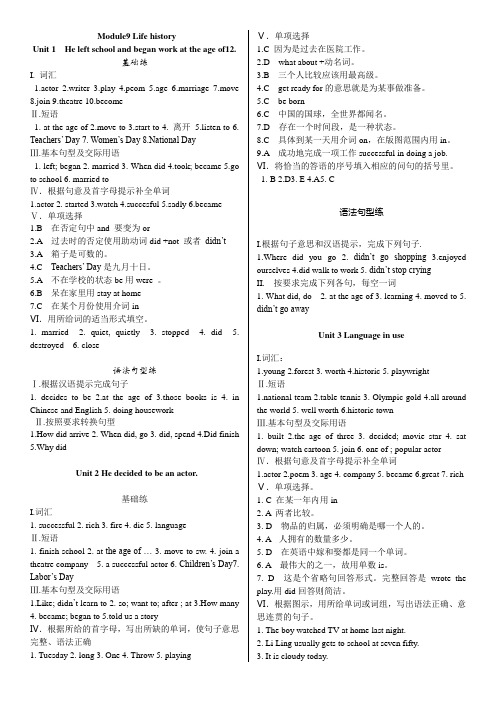
Module9 Life historyUnit 1 He left school and began work at the age of12.基础练I. 词汇1.actor2.writer3.play4.peom5.age6.marriage7.move8.join9.theatre 10.becomeⅡ.短语1. at the age of2.move to3.start to4. 离开5.listen to6. Teachers’ Day7. Women’s Day8.National DayⅢ.基本句型及交际用语1. left; began2. married3. When did4.took; became5.go to school6. married toⅣ.根据句意及首字母提示补全单词1.actor2. started3.watch4.succesful5.sadly6.became Ⅴ.单项选择1.B 在否定句中and 要变为or2.A 过去时的否定使用助动词did +not 或者didn’t3.A 箱子是可数的。
4.C Teachers’ Day是九月十日。
5.A 不在学校的状态be用were 。
6.B 呆在家里用stay at home7.C 在某个月份使用介词inⅥ.用所给词的适当形式填空。
1. married2. quiet, quietly3. stopped4. did5. destroyed6. close语法句型练Ⅰ.根据汉语提示完成句子1. decides to be2.at the age of3.those books is4. in Chinese and English5. doing houseworkⅡ.按照要求转换句型1.How did arrive2. When did, go3. did, spend4.Did finish5.Why didUnit 2 He decided to be an actor.基础练I.词汇1. successful2. rich3. fire4. die5. languageⅡ.短语1. finish school2. at the age of …3. move to sw.4. join a theatre company5. a successful actor6. Children’s Day7. Labor’s DayⅢ.基本句型及交际用语1.Like; didn’t learn to2. so; want to; after ; at3.How many4. became; began to5.told us a storyⅣ.根据所给的首字母,写出所缺的单词,使句子意思完整、语法正确1. Tuesday2. long3. One4. Throw5. playing Ⅴ.单项选择1.C 因为是过去在医院工作。

外研版七年级英语下册短语及重点句型汇总(Module9)外研版七年级英语下册短语及重点句型汇总odule9Lifehistor【重点短语】attheageof在…岁时 2.SpringFestive春节3.Teacher’sDay教师节4.bedifferentfro与…不同5.oen’sDay妇女节 6.findout发现7.NationalDay国庆节8.ontheInternet在网上9.children’sDay儿童节10.asell 也11.Neyear’sDay新年12.leaveschool离开学校13.ayDay/LabourDay劳动节14.inanyotherlanguages用许多其他的语言15.halfanhour半小时16.halfpastfive五点半17.beorthdoing值得做18.getarried结婚【重点句子】I’ritingabouthiforyEnglishclass.我在写关于他的介绍,上英语课要用的。
ecanfindoutabouthiontheInternet.我们可以在网上找到关于他的资料啊。
Heleftschoolandbeganorattheageof12.他12岁就离开学校开始了工作了。
hatdidhedo?他做过什么?Idon’tnotheexactdate.我不知道确切的日期。
ButhetoothenaearTainandbecaeveryfaousinthe1860s.不过在19世纪60年代,他用了马克•吐温这个名字,并且变得很有名。
Lieanypeoplefourhundredyearsago,Shaespeare’sparentsdidn’tlearntoreadorrite.像四百多年前的许多人一样,莎士比亚的父母不识字。
Atschoolheliedplays,sohedecidedtobeanactorhenhefini shedschoolat14.在他14岁毕业的时候,他决定成为一名演员。
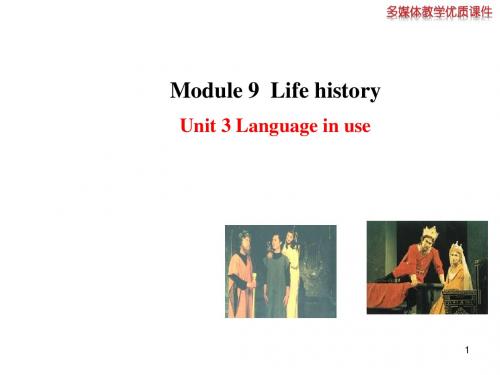
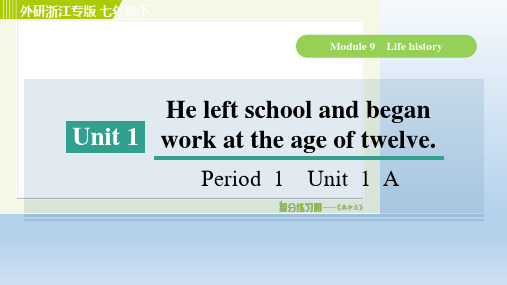
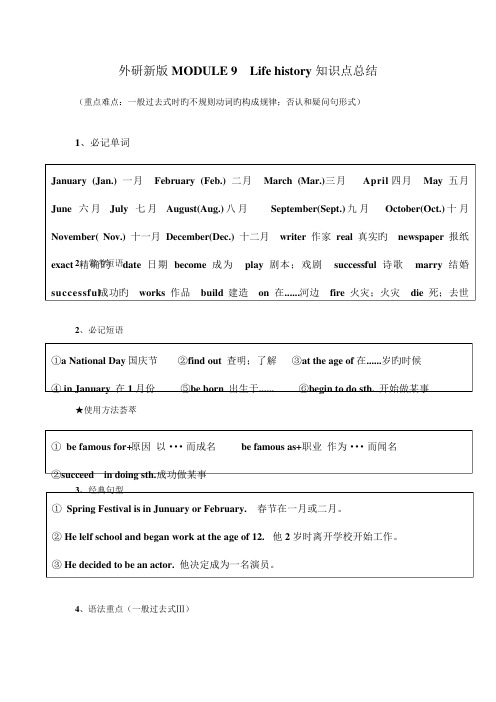
外研新版MODULE 9 Life history 知识点总结(重点难点:一般过去式时旳不规则动词旳构成规律;否认和疑问句形式)1、必记单词2、常考短语2、必记短语★使用方法荟萃3、经典句型4、语法重点(一般过去式Ⅲ)January (Jan.) 一月 February (Feb.) 二月 March (Mar.)三月 April 四月 May 五月 June 六月 July 七月 August(Aug.)八月 September(Sept.)九月 October(Oct.)十月 November( Nov.) 十一月 December(Dec.) 十二月 writer 作家 real 真实旳 newspaper 报纸exact 精确旳 date 日期 become 成为 play 剧本;戏剧 successful 诗歌 marry 结婚 successful 成功旳 works 作品 build 建造 on 在......河边 fire 火灾;火灾 die 死;去世 ① be famous for+原因 以···而成名 be famous as+职业 作为···而闻名②succeed in doing sth.成功做某事①a National Day 国庆节 ②find out 查明;了解 ③at the age of 在......岁旳时候 ④ in January 在1月份 ⑤be born 出生于...... ⑥begin to do sth. 开始做某事 ① Spring Festival is in Junuary or February. 春节在一月或二月。
② He lelf school and began work at the age of 12. 他2岁时离开学校开始工作。
③ He decided to be an actor. 他决定成为一名演员。
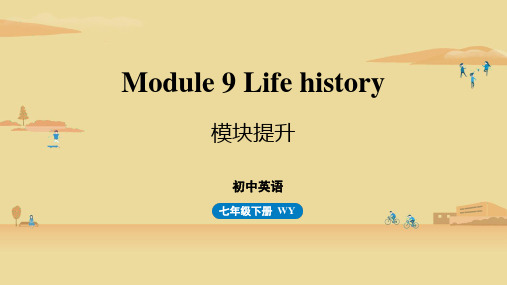
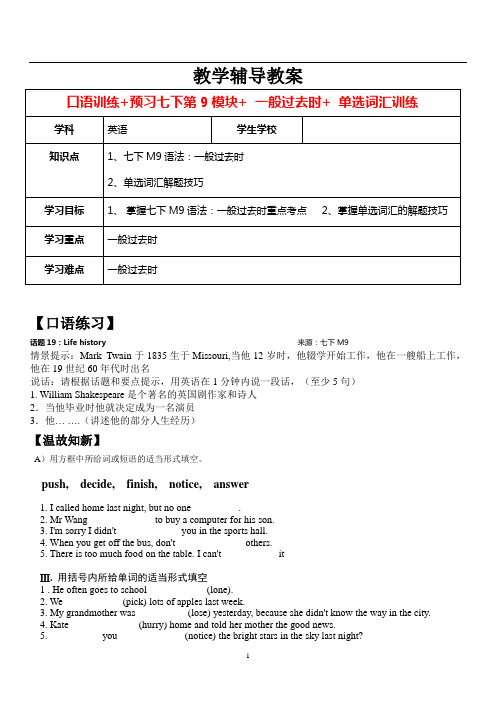
教学辅导教案口语训练+预习七下第9模块+ 一般过去时+ 单选词汇训练学科英语学生学校知识点1、七下M9语法:一般过去时2、单选词汇解题技巧学习目标1、掌握七下M9语法:一般过去时重点考点2、掌握单选词汇的解题技巧学习重点一般过去时学习难点一般过去时【口语练习】话题19:Life history来源:七下M9情景提示:Mark Twain于1835生于Missouri,当他12岁时,他辍学开始工作,他在一艘船上工作,他在19世纪60年代时出名说话:请根据话题和要点提示,用英语在1分钟内说一段话,(至少5句)1. William Shakespeare是个著名的英国剧作家和诗人2.当他毕业时他就决定成为一名演员3.他… ….(讲述他的部分人生经历)【温故知新】A)用方框中所给词或短语的适当形式填空。
push, decide, finish, notice, answer1. I called home last night, but no one _________.2. Mr Wang _____________to buy a computer for his son.3. I'm sorry I didn't ____________ you in the sports hall.4. When you get off the bus, don't _____________ others.5. There is too much food on the table. I can't ___________itⅢ. 用括号内所给单词的适当形式填空1 . He often goes to school ___________ (lone).2. We ___________ (pick) lots of apples last week.3. My grandmother was __________(lose) yesterday, because she didn't know the way in the city.4. Kate______________(hurry) home and told her mother the good news.5. __________ you _____________(notice) the bright stars in the sky last night?【新授课】1. Tom Sawyer, by the famous American writer, Mark Twain.by, 在这里表示“由…(创作),出自”。
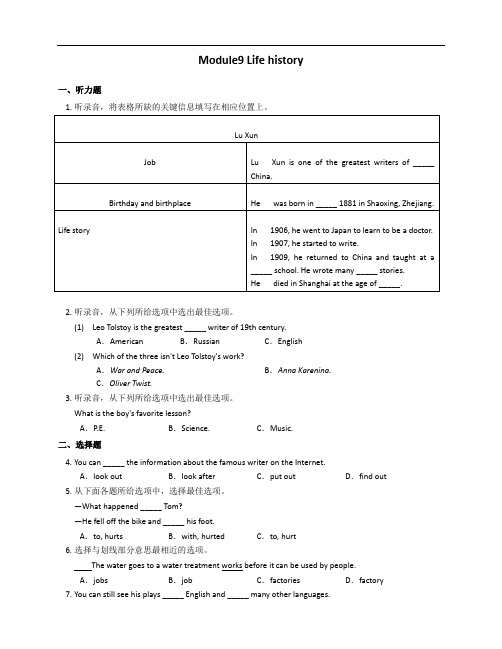
Module9 Life history一、听力题1.听录音,将表格所缺的关键信息填写在相应位置上。
2.听录音,从下列所给选项中选出最佳选项。
(1) Leo Tolstoy is the greatest _____ writer of 19th century.A.American B.Russian C.English(2) Which of the three isn't Leo Tolstoy's work?A.War and Peace.B.Anna Karenina.C.Oliver Twist.3.听录音,从下列所给选项中选出最佳选项。
What is the boy's favorite lesson?A.P.E. B.Science. C.Music.二、选择题4.You can _____ the information about the famous writer on the Internet.A.look out B.look after C.put out D.find out 5.从下面各题所给选项中,选择最佳选项。
—What happened _____ Tom?—He fell off the bike and _____ his foot.A.to, hurts B.with, hurted C.to, hurt6.选择与划线部分意思最相近的选项。
The water goes to a water treatment works before it can be used by people.A.jobs B.job C.factories D.factory 7.You can still see his plays _____ English and _____ many other languages.A.with; with B.in; in C.with; in D.in; with8.从A、B、C、D中选出可以填入空白处的最佳选项—These farmers have been to the United States.—Really? When _____ there?A.will they go B.did they go C.do they go D.have they gone9.从下面各题所给选项中,选择最佳选项。
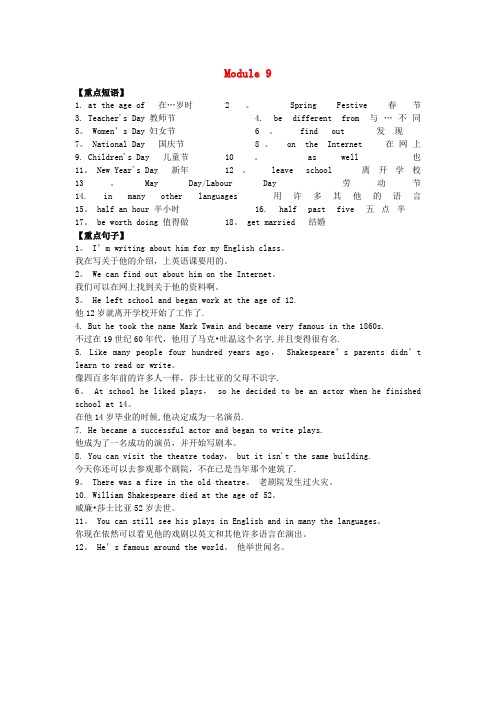
Module 9【重点短语】1. at the age of 在…岁时2。
Spring Festive 春节3. Teacher's Day 教师节 4. be different from 与…不同5。
Women’s Day 妇女节6。
find out 发现7。
National Day 国庆节8。
on the Internet 在网上9. Children's Day 儿童节10。
as well 也11。
New Year's Day 新年12。
leave school 离开学校13。
May Day/Labour Day 劳动节14. in many other languages 用许多其他的语言15。
half an hour 半小时16. half past five 五点半17。
be worth doing 值得做18。
get married 结婚【重点句子】1。
I’m writing about him for my English class。
我在写关于他的介绍,上英语课要用的。
2。
We can find out about him on the Internet。
我们可以在网上找到关于他的资料啊。
3。
He left school and began work at the age of 12.他12岁就离开学校开始了工作了.4. But he took the name Mark Twain and became very famous in the 1860s.不过在19世纪60年代,他用了马克•吐温这个名字,并且变得很有名.5. Like many people four hundred years ago,Shakespeare’s parents didn’t learn to read or write。
像四百多年前的许多人一样,莎士比亚的父母不识字.6。
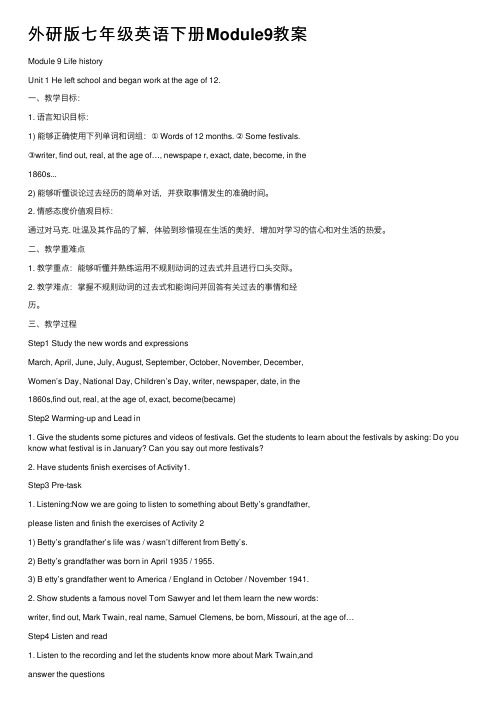
外研版七年级英语下册Module9教案Module 9 Life historyUnit 1 He left school and began work at the age of 12.⼀、教学⽬标:1. 语⾔知识⽬标:1) 能够正确使⽤下列单词和词组:① Words of 12 months. ② Some festivals.③writer, find out, real, at the age of…, newspape r, exact, date, become, in the1860s...2) 能够听懂谈论过去经历的简单对话,并获取事情发⽣的准确时间。
2. 情感态度价值观⽬标:通过对马克. 吐温及其作品的了解,体验到珍惜现在⽣活的美好,增加对学习的信⼼和对⽣活的热爱。
⼆、教学重难点1. 教学重点:能够听懂并熟练运⽤不规则动词的过去式并且进⾏⼝头交际。
2. 教学难点:掌握不规则动词的过去式和能询问并回答有关过去的事情和经历。
三、教学过程Step1 Study the new words and expressionsMarch, April, June, July, August, September, October, November, December,Women’s Day, National Day, Children’s Day, writer, newspaper, date, in the1860s,find out, real, at the age of, exact, become(became)Step2 Warming-up and Lead in1. Give the students some pictures and videos of festivals. Get the students to learn about the festivals by asking: Do you know what festival is in January? Can you say out more festivals?2. Have students finish exercises of Activity1.Step3 Pre-task1. Listening:Now we are going to listen to something about Betty’s grandfather,please listen and finish the exercises of Activity 21) Betty’s grandfather’s life was / wasn’t different from Betty’s.2) Betty’s grandfather was born in April 1935 / 1955.3) B etty’s grandfather went to America / England in October / November 1941.2. Show students a famous novel Tom Sawyer and let them learn the new words:writer, find out, Mark Twain, real name, Samuel Clemens, be born, Missouri, at the age of…Step4 Listen and read1. Listen to the recording and let the students know more about Mark Twain,andanswer the questions1)People can find out about Tom Sawyer ______.A. on TVB. on the InternetC. on the newspaper2)Mark Twain became famous_____.A. in 1835B. in 1860C. in the 1860s2. Read the dialogue and complete the table about Mark TwainTime FactsIn 1835 born in MissouriAt the age of 12 left school and began workIn the 1860s took the name Mark Twain and became famous3. Read and find the past form of the verbs in the conversation.4. Complete the sentences with the correct form of the words from the box.1)He began work at the ______ of 12.2) His ______ name was Samuel Clemens.3) He wrote for a(n) ______ .4) He _________ very famous.5) He went to _________, but he didn’t come to China.6) He is a great _________ .Step5 post-readingLet the students retell the retelling:Betty and Tony are 1._________ out something about Mark Twain on the Internet. Mark Twain, the famous American2.___________. He was3._____________ in 1835 in Missouri. He4. _______ school and5._________ work at the6.__________ of twelve. He wrote for a7.____________ and later he got work on a boa t. He didn’t stay in Missouri and he8.________ to write stories and he9. ________ the name Mark Twain and became famous in the 10._____________. Step6 Work in pairs. Ask and answer the questions about Mark Twain.— Did Mark Twain stay in Missouri?— N o, he didn’t.1. Was Mark Twain his real name?2. Did Betty read Tom Sawyer?3. Did Mark Twain leave school at 16?4. Did Mark Twain become a newspaper writer?5. Did Mark Twain come to China?Step7 Language Points1. Tom sawyer, by the famous American writer, Mark Twain.by 在此处表⽰“由……创作”。
Module 9 Life history Unit 3 Language in use一、Teaching materials:Unit 3 Language in use (Module 10 Life history)二、Targets for this period:To summarize and consolidate past simple questions and negative sentences and the new vocabulary三、Key points:Key vocabulary— in, a lotKey structures—Did you do…? Yes, I did. / No, I didn’t.We didn’t do ….四、Teaching methods:Task-based approach, formal and interactive approach五、Teaching aidsBlackboard, handouts六、Teaching arrangements:Step One To translate the sentences into English1.当你是个小男孩时,你骑自行车去上学吗?Did you ride a bike to school when you were a boy?2.他是世界上最出名的作家之一。
He is one of the most famous writers in the world.3.七、八月份,我和哥哥拜访了住在海边的阿姨。
In July and August, my brother and I visited my aunt near the sea.4.莎士比亚是一个戏剧家和诗人Shakespeare is a writer of plays and poems.5.1950年人们不使用移动电话和计算机。
In 1950 people didn’t use cell phones or computer.6.当他在十四岁毕业时他决定当一名演员。
He decided to be an act or when he finished school at the age of fourteen.7.你爹妈什么时候结婚的?When did your mother and father marry?8.二十八岁时他迁往伦敦并加入一家剧团。
At twenty-eight he moved to London and joined a theatre company.9.他成了一名成功的演员并开始写戏剧。
He became a successful actor and started writing p lays.10.你仍然能看到他的英文版和许多其他语言版的剧本。
You still see his plays in English and in many other languages.Step Two To complete the conversation (Activity 1)1.Students finish it by themselves.2.Check the answers in pairs.3.Two student act out the conversation.4.Detailed explanation:1)in +原料 / 颜色e.g: He is in black.He wrote a diary in ink. Cp: He wrote a diary with a pen.2) a lot = very much ; oftene.g: He learned a lot when he was a child.Step Three To use the conversation in Activity 1 to write about your parents. (Activity 3)1.Students finish it by themselves.2.Students read aloud their passage in the front of the classroom.(Students should pay attention to the tense)Example: My parents didn’t use computers at school when they were young. They watched TV with plain color and few channels. Sometimes they played football and tennis in the park.Step Four To learn about life in the past (Around the world)1.Students read the passage and answer questions.1)Did people use computers in 1950? No, they didn’t.2)Was there satellite TV or Internet in the past? No, there wasn’t.3)Why did people travel by bike or by bus? Because Cars were expensive.4)Did they go to other countries on holiday? NO, they didn’t.2. Students read it aloud.Step Five To answer the questions according to the actual life (Activity 5)1.Students do it by themselves.2.Students work in pairs.Step Six To finish all the exercises in WorkbookHomework:1. To review Module 10 and copy all the words and expressions in P1592. To finish Module10Unit 3 Language in useTeaching aims:Teach students how to write a passage the life in the future and the grammar of this module. Teaching important points:Teach students how to use so to write sentences.Let students get familiar with the structure will.Students will use computers. Teachers won’t write on blackboard with chalk.Homes will be cool in summer. They’ll have long holidays.Teaching di fficult points:Let students use the structure will.Teaching method:Five—step Teaching Method and Task—based Teaching Method.Teaching aids:Computer, tape-recorder, blackboardTeaching plan:Step 1 RevisionRevise the contents of the passage and retell the passage in class.Step 2. PresentationLook at the picture and write questions about the futureWill students go to school in the future?___________(students/use)pens and paper?____________(students/read)books?____________(students/go) to school to have lessons?___________(teachers/send)emails to students?Step 3 PracticeWork impairs. Ask and answer the questions.---Will students use pens and paper in the future?---No, they won’t. They will use computers.Ask students to put the word s in brackets in the correct place in the sentences.Our homes will b e warm in winter and cool in summer.(comfortable)Our comfortable homes will be warm in winter and cool in summer.Step 4 consolidationTask 1 around the worldLife in the future. We will have robots in our homes to do many jobs. Robots willclean the house, cook food, care for children and help old people. People will havea lot of free time.Task 2 Module taskDesigning your dream school.Work in pairs. Think about your dream school. Write your ideas below. Think aboutThe classroom, the lessons, and the playground.Task 3 Module taskWork in groups of four. Talk about your dream school. Decide on five good ideas.---What will your dream school have?---My dream school will have big classrooms。